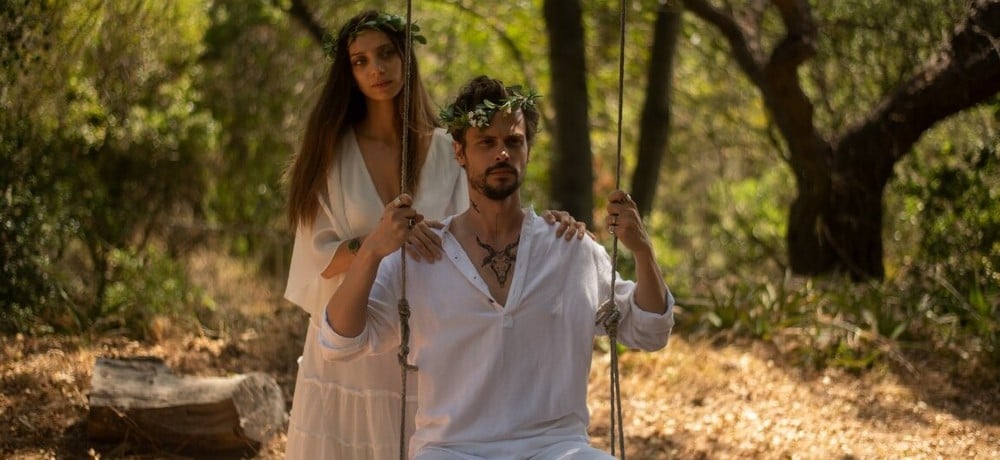


We’re all good people, but we’re full of shit. Or, as the characters in King Knight say, we all have “poo in our butts” (whether or not this applies to Juliette Binoche, however, is a topic of debate in the film). We’re all imperfect human beings, some more malicious than others, and it’s the outsider who receives the brunt of that malice. Writer-director Richard Bates Jr. (Excision, Tone-Deaf) looks at the outsider with a dark sense of humor and with a farcical approach, creating one of the best comedies of the year. While looking at religion, conservatives, and society in general, King Knight aims to present Wicca in a positive light. It succeeds, leading to a journey of acceptance and rebirth.
Thorn (Matthew Gray Gubler) is a witch, but not evil, he explains. His life partner Willow (Angela Sarafyan) is a registered nurse and supports his dream of starting a birdbath business. In this introduction to himself and his coven, he also clarifies that the reason they wear black isn’t macabre, but because it “flatters every skin tone.” Each member is given a proper welcome, narrated by Thorn and presented as paintings, like a wall of family portraits. Bates Jr.'s script emphasizes that the coven’s members are simply regular people. Desmond (Johnny Pemberton) is a lover of cinema and a member of the Juliette Binoche fan club, and his partner Neptune (Josh Fadem) is a postal worker who has an unhealthy sports betting addiction. Percival (Andy Milonakis) works retail and has a distrust of government institutions, while his partner Rowena (Kate Comer) is a social media influencer who sells herbal remedies. Angus (Nelson Franklin) is a brewery owner, and his partner Echo (Emily Chang) is a freelance writer. Bates Jr. effectively allows the audience to see themselves in every one of these characters.
Thorn acts as a therapist for the coven, as they come to him with their relationship woes. Its absurdist humor is seen in its early stages in these scenes as each couple comes to Thorn and Willow for advice. They pack a lot into these conversations as they touch on issues of sexuality, insecurity, acceptance, communication, and of course, love – all themes that remain present throughout the film. While Thorn and Willow listen attentively to the issues of others, they have problems of their own, and it’s only going to get worse as Thorn’s past catches up with him. When he’s invited to his high school reunion, we learn that the nonconformist High Priest used to be just a regular Chad, sending the coven into an existential crisis. The film is so well-written as it pokes fun at everything that seems normal about growing up as a white kid in America. This echoes a youth that’s built on pleasing parents and doing everything possible to make them proud and be an image of their design. The journey of growing into our true selves can be a long and difficult one, and for Thorn, Wicca helped him achieve that. In many ways, King Knight is about forging your own path and the strength it takes to do so.
While the film doesn’t dive too deeply into Wicca’s beliefs and theology, the eclectic production design helps give us a sense of this bohemian-esque lifestyle they live – spiritual and free. To society, they are treated like freaks as though they’re going to burst into flames if they step out into the sun, as Thorn’s Christian mother Ruth (Barbara Crampton) oh so kindly puts it. Instead, Bates Jr. rewrites that perception as Thorn and his coven are introduced wearing flower crowns and twirling ribbons. The audience is able to see their traditions and watch as they celebrate Beltane, a pagan holiday celebrating fire, fertility, and the beginning of summer. And it’s just one big party where they dance around wearing fairy wings and honor their life partner by renewing their vows. Witchcraft and Satanism are often synonymous, with witches portrayed worshipping at the altar of the devil. This is most recently seen in Netflix’s Fear Street series. Bates Jr. squashes this view, presenting Wicca as beautiful and as Thorn explains, a religion of “loving nature, promoting inclusivity and honoring women.”
What also adds to the beauty of experiencing the Beltane tradition is that it’s heightened with its use of color to the same effect as Henri-Georges Clouzot's Inferno. There is also bisexual lighting used much later as Thorn grapples with his past and present converging. That lighting style often denotes sexuality, but here it emphasizes the “othering” experience and the tug and pull of two halves of identity. The film is also about rebirth, and it's illustrated through a kaleidoscope of imagery in a stunning animated sequence. The film’s use of color is just as cool and sexy as Gubler himself. He’s like a ‘60s rockstar, one whose gaggle of fangirls would follow him across the country just to be in his presence (he also has a glorious dance scene). He and Sarafyan make the perfect pair; her calming energy complementing his own. Bates Jr. has gathered an incredibly talented group, each member deserving of praise, in an ensemble that will go down as one of the year’s best. And to top it off, you have Aubrey Plaza voicing a pine cone – what more could you ask for?
King Knight has the energy of smoking a joint by the ocean. Everything is calm and cool, and as you take a puff, you tilt your head back, close your eyes, and let yourself feel that ocean breeze. A film about learning to dance to your own rhythm, and knowing that that's okay because you’ll always have someone cheering you on.
Movie Score: 4/5